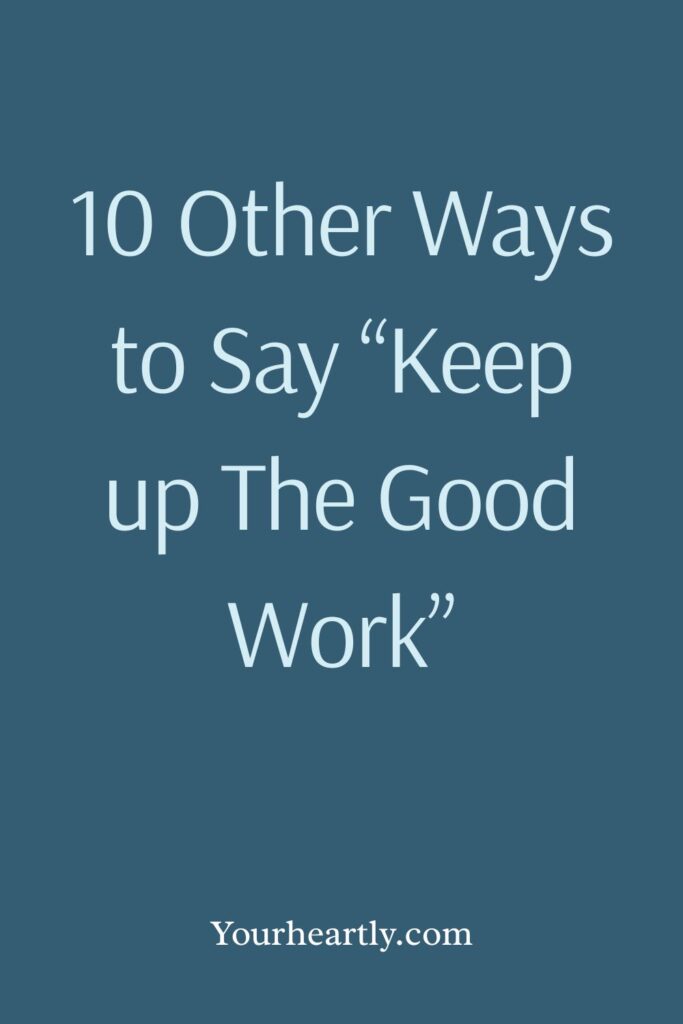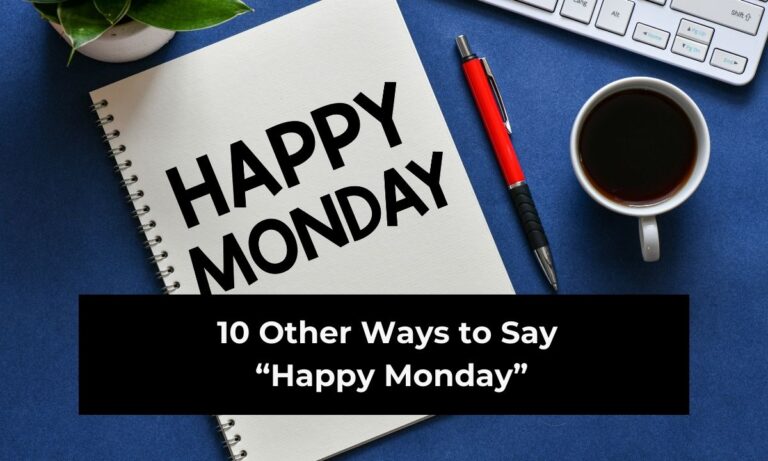When someone tells you “Keep up the good work,” it can feel motivating and affirming. But let’s be honest—it’s a phrase you’ve probably heard a hundred times. If you’re a manager, teacher, teammate, or even a friend, repeating the same words might start to sound repetitive. That’s why finding new and creative ways to express appreciation and encouragement matters.
You know how powerful words can be. A simple sentence can lift someone’s spirit, boost their confidence, and give them the motivation to keep going. Whether you’re congratulating a colleague on a job well done, motivating your child to continue their progress, or recognizing the effort of a friend, the right words can make all the difference.

Instead of relying on the same phrase every time, why not expand your vocabulary of encouragement? Choosing different expressions allows you to sound more genuine and thoughtful. It shows that you’re paying attention and that your praise comes from the heart, not just out of habit.

In this article, you’ll discover 10 other ways to say “Keep up the good work.” Each phrase is explained with practical examples and ideas for when to use it. By the end, you’ll have a fresh list of uplifting words you can use in conversations, emails, classroom settings, or even social media posts.
Ready to upgrade your encouragement toolkit? Let’s dive in.
1. “You’re Doing an Amazing Job”
When you want to recognize someone’s effort, telling them they’re doing an amazing job can feel more personal and powerful than a generic “good work.” This phrase adds warmth and enthusiasm, making the person feel truly valued.
Think about it: if someone tells you you’re doing an amazing job, you immediately feel proud of the effort you’ve put in. It communicates that your hard work is noticeable and that you’re excelling, not just meeting expectations.
This phrase works well in professional settings, such as when you’re giving feedback to an employee or team member. It also fits perfectly in personal situations, like encouraging your child on a school project or congratulating a friend on reaching a milestone.
To make it even more effective, pair the phrase with specific feedback. For example, instead of just saying, “You’re doing an amazing job,” you could say, “You’re doing an amazing job leading the team through this project. Your organization skills are making a big difference.” Adding context shows that your praise is sincere and not just empty words.
The next time you want to boost someone’s confidence, remember that this phrase can go a long way. It reassures them that their effort is worth it and inspires them to keep moving forward with the same energy.
2. “I’m Really Impressed by Your Efforts”
Sometimes, it’s not just the outcome that deserves recognition—it’s the effort behind it. Saying “I’m really impressed by your efforts” shifts the focus from the result to the dedication, hard work, and persistence someone puts in.
This phrase is especially encouraging for situations where success is not immediate. For instance, if a student has been practicing consistently or an employee has been putting in extra hours on a tough assignment, acknowledging their effort keeps their motivation alive even before they see the final payoff.
You can use this expression in both professional and personal settings. For example, you might tell a team member, “I’m really impressed by your efforts to stay organized during this busy season.” Or you could encourage a friend with, “I’m really impressed by your efforts to take better care of your health.”
What makes this phrase powerful is that it feels genuine and empathetic. It communicates that you see the hard work happening behind the scenes, not just the visible results. Everyone wants their dedication to be noticed, and this acknowledgment helps fuel resilience.
By using this phrase, you create an environment where effort is celebrated just as much as success. That kind of encouragement helps people stay motivated, even through challenges.
3. “Your Hard Work Is Paying Off”
There’s something deeply rewarding about hearing that the hours you’ve invested are making a difference. When you say “Your hard work is paying off,” you’re affirming progress and highlighting the results that are beginning to show.
This phrase works perfectly in situations where someone is starting to see the fruits of their labor. It could be a student whose grades are improving, a coworker who just closed a big deal, or even a friend who’s sticking to a fitness routine and showing results.
One of the strengths of this phrase is that it ties effort to outcomes. It tells the person that what they’ve been doing is working and that their persistence is worthwhile. This not only boosts confidence but also encourages them to continue on the same path.
For maximum impact, add detail to your feedback. Instead of only saying, “Your hard work is paying off,” you could say, “Your hard work is paying off—your leadership in this project is really making things run smoothly.” Specific compliments make the recognition more meaningful and believable.
If you want to motivate someone to stay consistent and keep striving for success, this phrase is a great choice. It connects their effort to progress, which is one of the strongest motivators out there.
4. “You’re Making Great Progress”
Progress, no matter how small, deserves recognition. When you tell someone, “You’re making great progress,” you remind them that improvement is happening, even if they haven’t yet reached the finish line.
This phrase is especially powerful for long-term goals. Whether it’s learning a new language, working on a big project, or developing a new skill, progress can sometimes feel slow. A reminder that the progress is visible can be exactly what someone needs to keep going.
For example, you might encourage a coworker with, “You’re making great progress on that presentation—it’s becoming more polished every day.” Or you could support a family member by saying, “You’re making great progress with your training; I can see how much stronger you’ve become.”
This phrase works well because it acknowledges both the journey and the growth along the way. It shifts focus away from perfection and highlights the value of consistent effort. People feel less pressure to be flawless and more inspired to continue improving.
By reminding someone of their progress, you help them recognize their own achievements. And often, that’s all they need to stay motivated and keep pushing forward.
5. “I Appreciate Your Dedication”
Dedication is a quality that deserves recognition. Saying “I appreciate your dedication” communicates gratitude and respect for someone’s consistent effort, reliability, and commitment.
This phrase is particularly impactful in professional settings, where dedication often drives results. For instance, you could tell an employee, “I appreciate your dedication to meeting deadlines—it’s a big reason our team is successful.” In personal life, you might say to a friend, “I appreciate your dedication to supporting me—it means a lot.”
What makes this phrase stand out is that it’s not just about the work being done, but the consistency and reliability behind it. Dedication is about showing up, even when things get tough. By acknowledging it, you validate the person’s perseverance and loyalty.
Pairing this phrase with specific details makes it even more meaningful. For example, “I appreciate your dedication to staying positive during challenges—it’s inspiring to the whole team.”
When someone feels that their commitment is seen and appreciated, it strengthens their motivation and deepens their connection with the people around them. That makes this phrase a powerful alternative to the usual “keep up the good work.”
6. “You’re Setting a Great Example”
Sometimes encouragement is about more than recognizing effort—it’s about showing someone the impact they’re having on others. Saying “You’re setting a great example” highlights the influence of their actions and the way others look up to them.
This phrase works particularly well in leadership or mentorship situations. For example, you could tell a team leader, “You’re setting a great example with your organization skills—it’s inspiring the rest of the group.” Or you might encourage a sibling by saying, “You’re setting a great example for the younger kids by sticking to your studies.”
The beauty of this phrase lies in how it connects an individual’s actions to the bigger picture. It tells them their behavior is noticed, respected, and influencing others positively. That recognition often motivates people to continue leading by example.
When you use this phrase, be specific about what example they’re setting. Mentioning qualities like persistence, kindness, or teamwork makes your praise feel authentic and impactful.
Encouragement isn’t just about motivating someone to keep going—it’s also about helping them recognize the positive ripple effect of their actions. This phrase does both beautifully.
7. “You’ve Come So Far”
Acknowledging progress is one of the most powerful forms of encouragement. Saying “You’ve come so far” helps someone reflect on the journey they’ve already taken and the achievements they’ve already accomplished.
This phrase is perfect for situations where someone might be feeling tired, overwhelmed, or doubtful about their progress. Reminding them of how far they’ve come can reignite their motivation and give them perspective.
You might use this phrase with a friend working on a personal goal, like, “You’ve come so far since you started your fitness journey—it’s inspiring to see.” Or in a workplace setting, “You’ve come so far with your leadership skills—it’s noticeable how much confidence you’ve built.”
What makes this phrase so effective is that it reframes challenges. Instead of focusing only on how much further there is to go, it helps someone appreciate the distance already covered. It fosters gratitude, pride, and resilience.
Sometimes, the best encouragement isn’t about pushing someone forward, but helping them pause and reflect on how much they’ve already accomplished. This phrase does exactly that, making it a powerful alternative to the usual “keep up the good work.”
8. “Your Effort Is Truly Making a Difference”
Everyone wants to feel like their work matters. Saying “Your effort is truly making a difference” validates the impact someone is having, whether in a small group, a workplace, or a community.
This phrase goes beyond complimenting effort—it connects effort to value. For example, you could tell a colleague, “Your effort is truly making a difference in keeping this project on track.” Or you might encourage a volunteer by saying, “Your effort is truly making a difference in people’s lives.”
The phrase is powerful because it taps into the human need for purpose. It reminds people that what they’re doing isn’t just busywork—it’s meaningful and important. That kind of recognition fuels long-term motivation and satisfaction.
To make it more personal, highlight exactly what difference their effort has made. For instance, “Your effort in mentoring new employees is truly making a difference—it’s helping them feel more confident and capable.”
When you use this phrase, you’re not just giving encouragement. You’re affirming someone’s value and reminding them that their contributions matter. And that’s one of the strongest motivators you can offer.
9. “I Value the Energy You Bring”
Sometimes encouragement isn’t just about the work being done, but the attitude and energy that comes with it. Saying “I value the energy you bring” highlights the positivity, enthusiasm, or creativity that someone contributes.
This phrase is great for situations where someone’s presence has a noticeable impact on the atmosphere. For instance, you could tell a team member, “I value the energy you bring to meetings—it keeps everyone motivated.” Or you might say to a friend, “I value the energy you bring to our group—it makes every gathering more enjoyable.”
What makes this phrase powerful is that it acknowledges intangible contributions. Not every achievement is measured by results—sometimes it’s about morale, creativity, or positivity. By recognizing these qualities, you show that you value the whole person, not just the tasks they complete.
To make your praise stronger, mention specific qualities. For example, “I value the energy you bring with your optimism—it makes challenges easier for everyone.”
When people feel their personality and energy are appreciated, they’re more likely to stay engaged and continue contributing in meaningful ways. This phrase captures that appreciation perfectly.
10. “Keep Striving—You’re on the Right Path”
Encouragement isn’t always about celebrating what’s already been achieved—it’s also about inspiring someone to keep moving forward. Saying “Keep striving—you’re on the right path” motivates people to stay consistent while affirming that their direction is correct.
This phrase is especially helpful for situations where success takes time. Whether it’s a student studying for exams, a professional developing new skills, or a friend chasing personal goals, reminding them that they’re headed in the right direction can keep them from feeling discouraged.
You could use this phrase at work, saying, “Keep striving—you’re on the right path with this project, and the progress is clear.” Or in personal settings, “Keep striving—you’re on the right path with your career choices, and it’s inspiring to watch.”
The beauty of this phrase is that it balances encouragement with guidance. It reassures someone that their current efforts are valuable while also motivating them to continue working toward their bigger goals.
For anyone who feels uncertain about their progress, this phrase can provide comfort, clarity, and motivation. It’s a thoughtful way to remind them that success isn’t about perfection, but persistence.
Conclusion
Encouragement is one of the simplest yet most powerful gifts you can give. While “Keep up the good work” is a familiar phrase, expanding your vocabulary of encouragement allows you to be more intentional and impactful.
By using alternatives like “You’re doing an amazing job,” “Your hard work is paying off,” or “You’re setting a great example,” you make your praise more personal and meaningful. Each phrase highlights different aspects of effort—whether it’s dedication, progress, or positive influence.
The key is to be specific and genuine. When people know exactly what you appreciate about them, your words carry greater weight. They feel seen, valued, and motivated to continue putting in their best.
So the next time you want to encourage someone, try reaching beyond the usual “Keep up the good work.” Choose words that truly reflect the impact they’re making, and you’ll inspire even greater effort and positivity in return.
FAQs
1. Why should I use alternatives to “Keep up the good work”?
Using alternatives keeps your encouragement fresh, personal, and more impactful. It prevents your praise from sounding repetitive or generic.
2. How can I make encouragement more meaningful?
Pair your words with specific details. Instead of a simple phrase, explain what exactly impressed you or what impact the person is making.
3. Can these phrases be used in professional settings?
Yes, many of these alternatives work perfectly in professional settings. Just adjust your tone to suit the relationship and context.
4. What if someone hasn’t achieved results yet?
Focus on effort and progress rather than outcomes. Phrases like “I’m really impressed by your efforts” or “You’re making great progress” work well.
5. How often should I give encouragement?
Consistency matters. Regular encouragement helps maintain motivation and builds stronger connections, whether at work, school, or in personal life.





